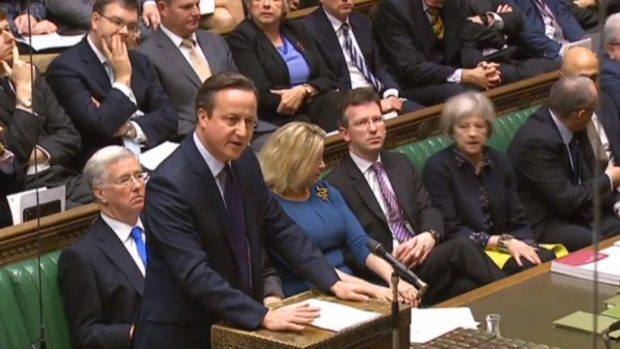David Cameron urged MPs to back air strikes on Islamic State in Syria yesterday – insisting the UK could not “stand aside” and let allies shoulder the burden.
But SNP Westminster leader Angus Robertson said his party would not vote in favour of extending military action unless key questions on ground troops and the long-term plan for reconstruction were “satisfactorily” answered.
Notably absent from the Commons debate was former First Minister Alex Salmond, the party’s international affairs spokesman at Westminster.
He was in Edinburgh to unveil a portrait of himself, accompanied by his schoolboy impersonator Ryan McGuigan.
Outlining his case for war, the Prime Minister said it was “morally” unacceptable to leave the burden on the shoulders of the US, France and other allies.
He said military action was in Britain’s national interest and insisted there was a strong legal justification on the grounds of self-defence and the UN Security Council resolution.
The Tory leader also said the advice he had received was that inaction posed a greater risk than intervening.
And stressing the need to act immediately, he asked: “If not now, when?”
But he ruled out British boots on the ground and said he would not call a vote until there was a “clear majority” in support of air strikes.
In a briefing after his statement, his spokeswoman refused to elaborate on what that meant or give a timetable for putting the question to the House.
Addressing the concern that extending air strikes into Syria would increase the threat of a terrorist atrocity in Britain, the PM said the security agencies agreed the UK was already “in the top tier of countries that Isil is targeting”.
He accepted IS could not be beaten from the air alone, arguing he was pursuing an “Isil-first” strategy while also working for a stable long-term political settlement and providing humanitarian support, as well as focusing on countering extremism at home.
Mr Robertson questioned Mr Cameron about the 70,000 Free Syrian Army troops the Prime Minister indicated would form the ground force, alongside Kurdish fighters.
The Moray MP asked how many were on the front-line against IS as opposed to battling Syrian regime forces.
He also pressed the PM on the issue of reconstruction, noting the UK spent 13 times more on bombing Libya than on stabilising and rebuilding the country after the conflict.
And he reminded MPs that only two years ago Mr Cameron appealed – unsuccessfully – for their backing to bomb IS’s opponents in Syria.
Asked about the figure of 70,000 in the briefing, the PM’s spokeswoman said it was based on “detailed analysis”, but she would not be drawn on whether the force was considered “enough” to defeat IS.
She said she did not have any figures for the size of IS forces or the Syrian army itself, but added she had requested the information.
Labour leader Jeremy Corbyn warned of “unintended consequences”, but did not make his party’s position clear in the chamber.
The shadow cabinet held a 90-minute meeting after the statement, but no decision was reached on whether to back action or whip a potential vote.
London MP and close ally of Mr Corbyn, Diane Abbott, said people were going to “go away and think about it over the weekend”.
Later in the debate, Mr Cameron warned the Government “might lose the public” if it starts to refer to IS, also known as Isil and Isis, as Daesh.
